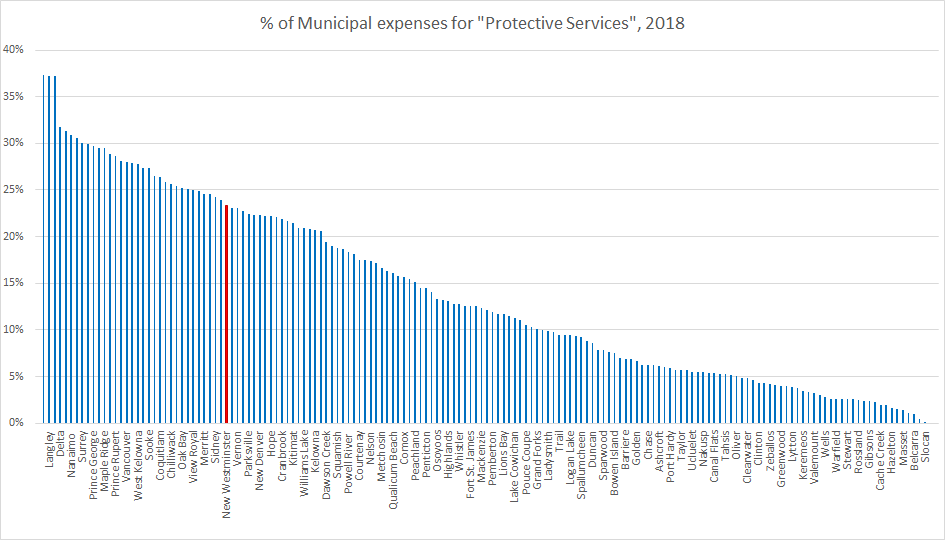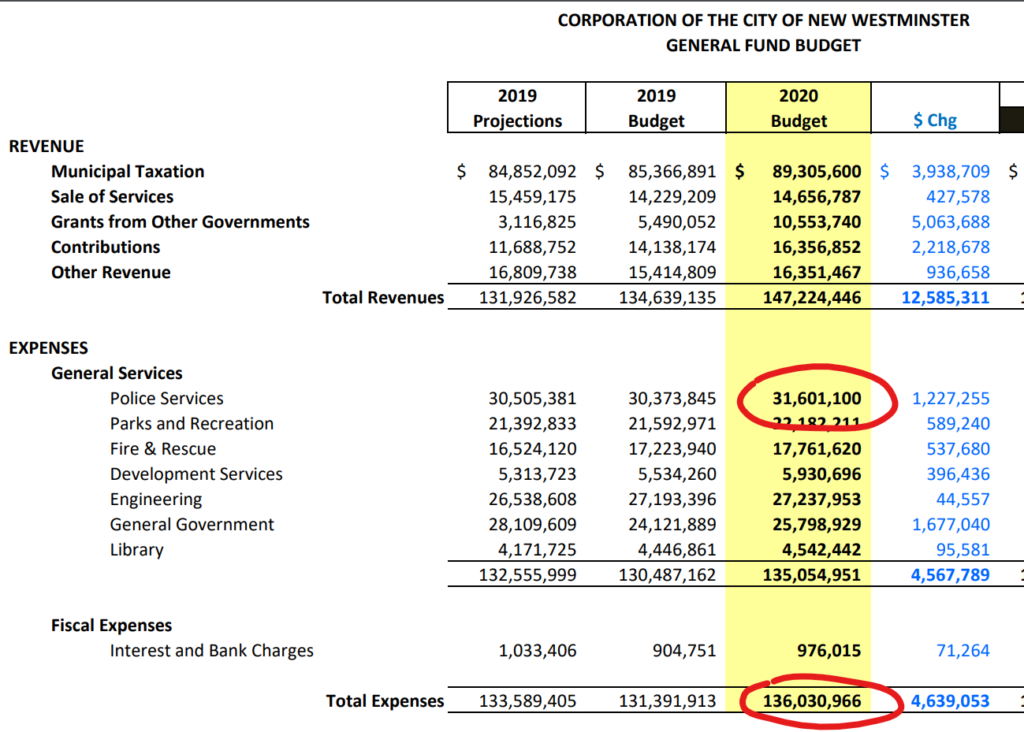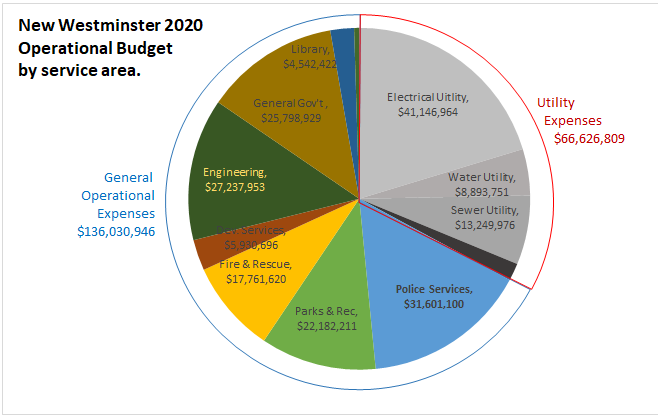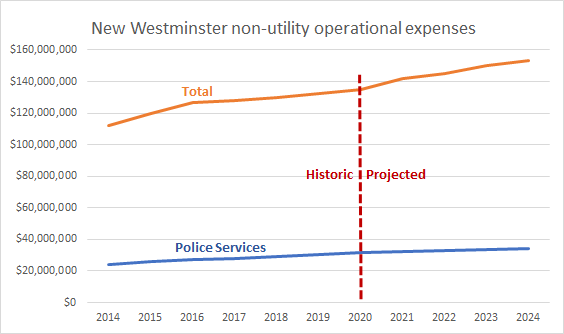We had more of a regular longer-agenda meeting this week, though of course many of the topics were not “normal”, and we did things on-line, so normal as normal can be. Again, if you go here you can read the agenda and reports, and even listen to a recording of the meeting to see where the conversations went.
We started with two presentations on the City’s budget:
Financial Plan, 2020-2024
As discussed last week, we have a 5-year Financial Plan ready to go to Bylaw. This is a slightly pared-back budget compared to the earlier version presented before the current chaos arrived, with a somewhat less ambitious capital plan and all new spending suspended other than funds already committed, reflecting the uncertainty of the times. People asking for a “property tax freeze”, this is about as close as we can get while maintaining legal and contractual obligations.
The City’s Financial Sustainability and Changes to City Services and Major Projects – COVID 19 Implications
This report is a broader discussion of the City’s potential financial position as this crisis unfolds. We have had many discussions in both open and closed Council as we have worked to better understand revenue impacts, human resources effects, and the service changes that are resulting from the state of emergency. It is clear this is uncharted territory for us, and for every local government. City staff have been doing heroic work (and they are all humans like you and me, feeling the same stresses about their families, their livelihoods, the future of their community, which has not made this work easier) trying to assure we have the necessary information to make our best estimates about where we are going, so we can make as informed decisions as possible.
Staff have developed a few revenue models based on how long the current public health restrictions go on, and how fast the economic recovery is. There is a best case and a worst case, and staff further developed the “medium” case. This scenario would see about a $50 Million drop in cash flow in the second quarter of 2020. Some of these revenues would be lost forever, some only deferred until later in the year or 2021. We expect (again, in this moderate scenario) that we would be missing $35M in cash flow over all of 2020, and a little more than $11M of revenue would be gone forever.
We have already done some work to prepare to operate with the reduced cash flow, the overall lost-forever revenue will take significant changes in plans. The report outlines where $11M in reduced expenses might be found: reduced shifts to auxiliary staff, freezing hiring for vacant positions and reducing overtime spending primary among them. We would also be putting off some contracted work, and seriously reducing our supplies and materials budget.
As far as the Capital Budget goes, staff have worked through the capital plan and prioritized projects scheduled for 2020. Some will have to continue because they represent business continuity, life safety, and core operations. Some are possible to delay three months or longer to assist with the cash flow situation, and some are going to be punted down the road further.
Each of the 10 departments in the City have presented some cost savings plans to reflect the above, and a short report is attached from each. There is a lot of detail here about programs that are considered essential, and those that are being delayed.
The following items were Moved on Consent:
TransLink/SkyTrain Guideway (22nd Street Station to New Westminster Station): Construction Update
This is just a note to update Council that the delayed work being done on rail and rail pad replacements between 22nd Street Station and New West Station is finally going to start up, and occur in April and May. This may mean some noise at night for nearby residents.
2020 Spring Freshet and Snow Pack Level
This is our update on snowpack in the Fraser Basin as is usual for this time of year to allow us to plan if freshet floods are more or less likely this year. It looks like snow packs are higher than average and quite a bit higher in the mid-basin areas. The flood risk is higher than usual, but the weather for the month ahead will be the determining factor. Our emergency services have done a bit of prep work (dike inspections and sandbag procurement), but no-one is panicking yet.
Statistical update from the New Westminster Police Department
This is an interesting statistical report on the impact of the pandemic on crime rates. Counts of reported offences of most types for March 2020 are below 2019, and property offences for 2020 are below the 5-year average, though persons offences are slightly above the average. Bucking the trend, thefts from vehicles are going up, as are break-and-enter offences.
The following items were Removed from Consent for discussion:
COVID-19 Pandemic Response – Update and Progress from the Six Task Forces
This is our weekly update on what the six working groups on COVID response are doing.
Again, I encourage you to read these reports, and I don’t want to transcribe them here. There is a lot going on in the City to address the impacts of the crisis, and it is interesting as they are starting to transition from the figuring-things-out to the get-things-done phases.
Parks Regulation Amendment Bylaw No. 8193, 2020 – A Bylaw to Amend Parks Regulation Bylaw No. 3646 in response to the COVID-19
A few may have noticed that not all residents are taking the closures and limits to use of some parks infrastructure as seriously as others. Some equipment and areas, such as tennis courts and playground equipment, have been closed because their use was not consistent with physical distancing requirements. Unfortunately, some people have taken to ignoring these closures, even going to far as to remove fencing and cutting locks to access some facilities. As is not unusual, 95% of people will respect community safety measures if they are provided good information as to why and how; for them education is the key. The other 5% need enforcement or at least the threat of enforcement.
We can use trespassing laws to enforce closures, but they are harsh, and are therefore more difficult to enforce. We are instead adapting the Parks Bylaw and ticketing bylaw to clearly define the offence and make it easier for Bylaw Officers to issue tickets for scofflaws. There will also be new signage installed informing of the fines and the increased intent to enforce them. We also had a bit of a conversation about assuring the fines were not used punitively, but were reserved for serious scofflaws that were clearly not interested in respecting the public health concerns of the community.
COVID-19 Pandemic: Food Security Planning and Responses
This crisis had been hard on people in the City who are food insecure. The Food Bank and other organizations have had to change how they operate to address physical distancing protocols. Fortunately, there are a great number of organizations providing for the food security of those in desperate need, and the City is helping them coordinate their programs. The Salvation Army, the Gurdwara Sahib Sukh Sagar in Queensborough, Prupose society, Union gospel Mission, and even a few businesses are helping out with hot meals and food hampers, along with the Food Bank operating out of Tipperary Park alongside the Farmers Market every Thursday. This was a report for information, but we had a bit of discussion about upcoming opportunities for the City to further expand this program during this time of need.
Covid-19: Interim Development Review Process
The development review process has slowed down in the City. This is a problem for several reasons, not the least being the ongoing housing crisis and rental availability crisis, but also is a problem for homeowners wanting to do significant renovations and other projects in the City for things like childcare and services. There is also the concept of procedural fairness – if you own a property in the City, you have a right under provincial law to fair process and the City has a responsibility to do whatever they can to provide it.
Staff have still been working these processes internally, but some need to come to committee or Council for their next steps. Not a problem for Council 9we can do this work in our now-regular virtual meetings), but many committees are not meeting, and public engagement is difficult. Public Hearings are especially difficult as provincial legislation was developed with personal appearance in Council Chambers the default Public Hearing participation method. We can debate (and have!) whether this is the right process in the internet age, but we are kinda stuck without better guidance from the provincial government.
This report outlines a few adjustments, including some of the City Advisory committees meeting virtually, and putting the onus on developers to demonstrate ways they are performing Public Engagement through mail, media, or other methods during the physical distancing era. We have a few very active Residents Associations with long contact lists, which may help in this case, but there is more work to be done here. Finally, staff will be reporting back in May on potential new guidance on Public Hearings after consulting with the provincial government.
Waste Reduction and Recycling Community Engagement Results
The closing of the recycling centre next to the Canada Games Pool and integration of some of our recycling services with neighboring communities has resulted in a lot of conversation about recycling in the City. This is happening at a time when regional and global recycling systems are going through major transitions, resulting in the “bottom falling out” of most recycled material commodity markets. Still, people want to recycle, and it is difficult right now to re-negotiate contracts with product stewardship agencies that would take recycled materials, or set up new or temporary collection systems.
That said, over the months before the pandemic, the City ran a series of community events to collect info about peoples recycling needs and desires. This is the reporting out of the results of that engagement. Glass, Styrofoam and soft plastic are the three top identified materials that were challenging to recycle. No surprise those are the three materials that are most difficult to recycle once collected by the City. Some concerns were also raised about green waste.
For green waste, the City allows unlimited curbside collection (in kraft paper bags) and the City covers the cost of depositing green waste at the Coquitlam transfer station until the new facility on the New West/Coquitlam border is opened. Curbside and free drop-off are both available, take your choice.
The report outlines the potential for adding curbside glass pickup. This would require new containers, and a bit of additional labour cost. Glass is worth very little in the recycling market (the ~125 Tonnes we would expect to collect per year would yield something like $10,000), so the resultant cost per single family home is estimated at about $11 per year. Council asked staff to look into this a little more and develop a detailed proposal for Council to consider.
Staff is also going to look into more options for soft plastic and Styrofoam, beyond the three current locations in the City where they can be dropped off. I am less optimistic about this, as these products have no value right now, and the cost for us to collect and get them to RecycleBC is probably prohibitive.
I see a structural problem here in how the “Extended Product Responsibility” (EPR) model run my RecycleBC works. Recycle BC is an industry-led consortium that is empowered by provincial law to facilitate recycling, and the cost of processing recycled materials is meant to be borne by industry and worked in to the purchase price of products. When you buy this packaging material, you pay for the recycling of it; that is how the EPR system is meant to work. But if you are expected to pay more (through property taxes or utility fees) to get the material to the recycling centre, you are effectively paying twice for recycling.
This become a political discussion between the City and the provincial government, and cannot be disconnected from nascent efforts to limit of ban single-use plastics and non-recyclable materials in the province. More to come here, but probably no-one had bandwidth to dig too deeply into it until after the COVID times.
2020 Property Tax Payment Due and Penalty Dates
The City is recognizing that many residents may be in a difficult financial situation this spring, Council is approving a waiving of late penalties until October 1st. The due date for your taxes is still July 2nd, and if you have the ability, please pay them then, as it reduces the risk that the City will have to borrow money to cover temporary cash flow. If you are not able to pay until October 1st, the penalty we usually charge (5% on July 2nd, another 5% on September 2nd) will not be applied in 2020.
We then Adopted a few Bylaws:
Five-Year Financial Plan (2020 – 2024) Bylaw No. 8183, 2020
As discussed at length for the last 4 months, and detailed above, the Financial Plan Bylaw was approved by Council.
Parks Regulation Bylaw Amending Bylaw No. 8193, 2020
Bylaw Notice Enforcement Amendment Bylaw No. 8194, 2020 and
Municipal Ticket Information Amendment Bylaw No. 8195, 2020
As discussed above, these Bylaws that provide ticketing and fining power to Bylaw Officers for scofflaws ignoring parks closure signage and warnings were adopted by Council.
Finally, we had one piece of New Business
Graffiti Removal Councillor Puchmayr
BE IT RESOLVED THAT during this pandemic crisis, while many local businesses are closed and not able to provide a higher degree of vigilance, that the City of New Westminster waive the current graffiti remediation policy and deploy a graffiti remediation crew to deal with new graffiti as quickly as possible.
This idea was referred to the two task forces that are operating to support Business Continuity and the Education and Enforcement aspects of the pandemic response.
And that ended the new strange (face it, this is not normal) meeting for the week.



